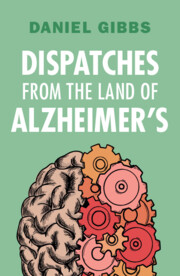Book contents
- Dispatches from the Land of Alzheimer’s
- Reviews
- Dispatches from the Land of Alzheimer’s
- Copyright page
- Dedication
- Lost in Thought
- Contents
- Acknowledgments
- Prologue
- 1 Physician Heal Thyself
- 2 Evaluating New Advances in Alzheimer’s Research
- 3 Alzheimer’s Dementia or Alzheimer’s Disease
- 4 The First Patient with Alzheimer’s Disease
- 5 Kidnapped in Kinshasa
- 6 Smell, Disgust, and Alzheimer’s
- 7 Apolipoprotein-4 (APOE-4)
- 8 Lost in the Fog of Alzheimer’s
- 9 My Father’s “Stuff”
- 10 Face Blindness during a Pandemic
- 11 Biomarkers for Alzheimer’s Disease
- 12 Olfactory Impairment in Covid-19 and Alzheimer’s
- 13 Alzheimer’s Disease and Work
- 14 Crossword Controversies
- 15 Can Loneliness Increase Risk for Dementia?
- 16 Excessive Laxative Use and Dementia
- 17 Dog Dementia (Canine Cognitive Dysfunction)
- 18 The Possible Role of Brain Inflammation in Alzheimer’s Disease May Be More Significant in APOE-4 Carriers
- 19 Surprisingly Good News about the Acetylcholinesterase Inhibitors (Donepezil, Rivastigmine, and Galantamine)
- 20 More about the Importance of Exercise
- 21 Rolling on the River
- 22 The MIND Diet Revisited
- 23 My Photographs, Then and Now
- 24 Does Cataract Surgery Really Decrease the Risk of Dementia?
- 25 Hearing Loss, Aphasia, and Dementia
- 26 To Sleep, Perchance to Dream
- 27 The Amyloid Hypothesis Is Not Dead, but It May Be Gasping for Breath
- 28 Could Lecanemab Offer a Ray of Hope?
- 29 A Fatal Case of Multiple Brain Hemorrhages Associated with Lecanemab
- 30 Cerebral Amyloid Angiopathy (CAA)
- 31 Hitting the Sweet Spot in the Spectrum of Alzheimer’s Disease for Future Trials of Anti-Amyloid Medications
- 32 Disappointing Results of Two Human Trials of Monoclonal Antibodies in Parkinson’s Disease
- 33 Repurposing Old Drugs for Alzheimer’s Treatment
- 34 Writing While Impaired
- 35 Spreading the Word
- 36 Saying Goodbye to Lizzie G
- 37 Amyloid and Tau PET Scans of My Brain
- 38 Running on a Field of Dreams
- 39 Living in the Moment with Alzheimer’s
- Index
- Plate Section (PDF Only)
- References
19 - Surprisingly Good News about the Acetylcholinesterase Inhibitors (Donepezil, Rivastigmine, and Galantamine)
Published online by Cambridge University Press: 19 January 2024
- Dispatches from the Land of Alzheimer’s
- Reviews
- Dispatches from the Land of Alzheimer’s
- Copyright page
- Dedication
- Lost in Thought
- Contents
- Acknowledgments
- Prologue
- 1 Physician Heal Thyself
- 2 Evaluating New Advances in Alzheimer’s Research
- 3 Alzheimer’s Dementia or Alzheimer’s Disease
- 4 The First Patient with Alzheimer’s Disease
- 5 Kidnapped in Kinshasa
- 6 Smell, Disgust, and Alzheimer’s
- 7 Apolipoprotein-4 (APOE-4)
- 8 Lost in the Fog of Alzheimer’s
- 9 My Father’s “Stuff”
- 10 Face Blindness during a Pandemic
- 11 Biomarkers for Alzheimer’s Disease
- 12 Olfactory Impairment in Covid-19 and Alzheimer’s
- 13 Alzheimer’s Disease and Work
- 14 Crossword Controversies
- 15 Can Loneliness Increase Risk for Dementia?
- 16 Excessive Laxative Use and Dementia
- 17 Dog Dementia (Canine Cognitive Dysfunction)
- 18 The Possible Role of Brain Inflammation in Alzheimer’s Disease May Be More Significant in APOE-4 Carriers
- 19 Surprisingly Good News about the Acetylcholinesterase Inhibitors (Donepezil, Rivastigmine, and Galantamine)
- 20 More about the Importance of Exercise
- 21 Rolling on the River
- 22 The MIND Diet Revisited
- 23 My Photographs, Then and Now
- 24 Does Cataract Surgery Really Decrease the Risk of Dementia?
- 25 Hearing Loss, Aphasia, and Dementia
- 26 To Sleep, Perchance to Dream
- 27 The Amyloid Hypothesis Is Not Dead, but It May Be Gasping for Breath
- 28 Could Lecanemab Offer a Ray of Hope?
- 29 A Fatal Case of Multiple Brain Hemorrhages Associated with Lecanemab
- 30 Cerebral Amyloid Angiopathy (CAA)
- 31 Hitting the Sweet Spot in the Spectrum of Alzheimer’s Disease for Future Trials of Anti-Amyloid Medications
- 32 Disappointing Results of Two Human Trials of Monoclonal Antibodies in Parkinson’s Disease
- 33 Repurposing Old Drugs for Alzheimer’s Treatment
- 34 Writing While Impaired
- 35 Spreading the Word
- 36 Saying Goodbye to Lizzie G
- 37 Amyloid and Tau PET Scans of My Brain
- 38 Running on a Field of Dreams
- 39 Living in the Moment with Alzheimer’s
- Index
- Plate Section (PDF Only)
- References
Summary
In 1993, the first acetylcholinesterase inhibitor (AChEI), tacrine, was approved by the FDA for treatment of dementia. This class of medication is thought to work by raising levels of acetylcholine, an important neurotransmitter in the brain. There was a lot of excitement about the approval of tacrine, but almost immediately severe side effects including serious liver damage were encountered, and the use of the drug dwindled and disappeared almost overnight. I don’t think I ever wrote a prescription for tacrine. Three years later the first relatively safe AChEI, donepezil (trade name Aricept), was approved and it is still going strong. Within a few years, two similar drugs, rivastigmine and galantamine, were approved. They were all about equally effective. They all had similar side effects, but sometimes a person could tolerate one better than another. For an individual patient, it was hard to tell for sure if they were effective or not. A few of my patients had remarkable improvement and others didn’t seem to change much at all. For others, the side effects were intolerable. Most common were nausea, cramps, and diarrhea as well as nightmares and insomnia. I found that starting my patients at a very low dose, lower than recommended, and very slowly increasing the dose over several months would usually avoid the side effects.
- Type
- Chapter
- Information
- Dispatches from the Land of Alzheimer's , pp. 77 - 81Publisher: Cambridge University PressPrint publication year: 2024

